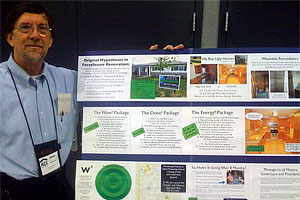 Dave Robinson is the "anti-flipper." Credit: Tom White
Dave Robinson is the "anti-flipper." Credit: Tom White
I'm in Kansas City at the annual national meeting of Affordable Comfort, Incorporated, (ACI) an organization that helps train weatherization technicians, energy auditors, and other home performance contractors. It's an exciting time to be in the field. While new housing is stalled in the United States, there is lots of funding-in the billions of dollars-on the way for weatherization, residential energy efficiency, and renewable energy through the American Recovery and Reinvestment Act. But economic relief is not coming fast enough for the cab driver, a native of Nigeria, who drove me to the convention center from the airport. "What's this I hear about a bailout?" he complained. "The bailout I want is for a rich banker to leave his wallet in my cab!"
The cab driver is a renter, and when I told him that the conference he was driving me to was about residential energy efficiency, health, sustainability, and affordability, he complained that his landlord is not interested in making his rental home energy efficient, since the landlord doesn't pay the energy bills. We call this a split incentive. The split incentive facing the imaginary bankers in the back seat of my driver's cab-he wants to keep the bailout money for himself but he's supposed to use it to help people struggling in a down economy-may not end up putting a fat wallet in the cabbies back seat.
I met a man here who can handle a split incentive pretty well. David Robinson is a retired contractor who recently started doing what he calls Energy-Wise Renovations of foreclosed homes. He is buying clusters of homes in rundown neighborhoods in the South Bay, and retrofitting them with measures such as R-50 insulation in the attics, air sealing, and Energy Star appliances. But he is also creating some pretty stylish kitchens, redoing hardwood floors, and installing granite countertops, crown molding, and wainscoting in these homes. "You can't sell a home on energy efficiency alone," says Robinson.
Robinson is having no problem selling these houses for 20% above market prices, and he's still giving the homebuyers, and the neighborhood, a very good deal. "I believe that there is a wonderful and huge opportunity in bank-owned foreclosures-millions of them-and we must rescue all those wonderful opportunities from the normal house flippers who would turn them into a rental and lower the values and miss the opportunity for deep energy reduction. I buy all foreclosed homes and don't feel bad about beating up the bank to get the really good deals."
Robinson is looking for former or current realtors, and financial backers. He wants to teach them his method and therefore accelerate the process of converting our housing stock to affordable, efficient, and sustainable housing, and to make a good living doing so. If you want to know more, call him at (605) 475-4800.
